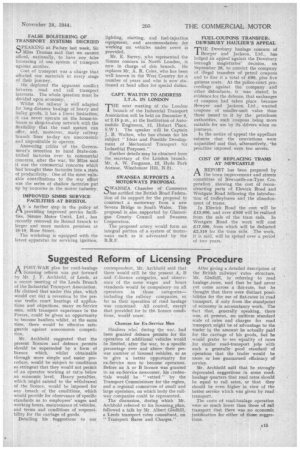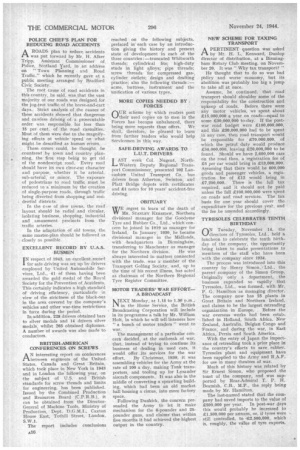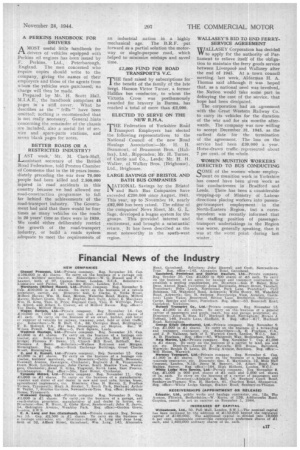Suggested Reform of Licensing Procedure
Page 17

Page 18

Page 19

If you've noticed an error in this article please click here to report it so we can fix it.
A POST-WAR plan for road-haulage Pt licensing reform was put forward by Mr. J. F. Archbold, of Leeds, at a recent meeting of the Leeds Branch of the Industrial Transport Association. He claimed that under this plan, which would cut out a reversion to the prewar traffic court hearings of applications and objections, many ex-Service men, with transport experience in the Forces,, could be given an opportunity to become hauliers whilst, at the same time, there would be effective safeguards against uneconomic competition.
Mr. Archbold suggested that the present licences and defence permits should be superseded by a form of licence which, whilst obtainable through more simple and easier procedure, would be subject to conditions so stringent that they would not permit of an operator working at ratz,s below an economic level. Heavy penalties, which might extend to the withdrawal of the licence, would be imposed for any breach of the conditions, which would provide for observance of specific standards as to employees' wages and working hours, maintenance of vehicles, and terms and conditions of responsibility for the carriage of goods.
Detailing his e.uggestions to our correspondent, Mr. Archbold said that there would still be the present A, B and C-licence categories, and observance of the same wages and hours standards would be compulsory on all operators in those categories— including the railway companies, so far as their operation of road haulage was concerned. All control, except that provided for in the licence conditions, would cease.
Chances for Ex-Service Men Hauliers who during the war, had been granted defence permits for the operation of additional vehicles would be limited, after the war, to a specific percentage over and above their prewar number of licensed vehicles, so as to give a better opportunity for ex-Service men to become operators. Before an A or B licence was granted to an ex-Service newcomer, his credentials would be " vetted " by the Transport Commissioner for the region, and a regional committee of small and large operators, on which body the railway companies could be represented.
The discussion, during which Mr. Archbold referred to his licensing.plan, followed a talk by Mr, Albert Gledhill, a Leeds transport rates consultant, on " Transport Rates and Charges." After giving a detailed description of the British railways' rates structure, Mr. Gledhill, in referring to road haulage .rates, said that he had never yet come across a flat-rate, but he thought that there were distinct possibilities for the use of flat-rates in road transport, if only from the standpoint of economy in accountancy work. The 'fact that, generally speaking, there was, at present, no uniform standard scale of rates and charges for road transport might be of advantage to the trader in the amount he actually paid for the carriage of his goods, but he would prefer to see equality of rates for similar road-transport jobs with such a generally good standard of operation that the trader would be more or less guaranteed efficiency of service.
Mr. Archbold said that he strongly deprecated suggestions in some roadhaulage quarters that road rates should be equal to rail rates, or that they should be even higher in view of the better service which was given by road transport.
The costs of road-haulage operation were so much lower than those of rail transport that there was no economic justification for either of those suggestions. POLICE CHIEF'S PLAN FOR REDUCING ROAD ACCIDENTS
AROADS plan to reduce accidents was put forward by Mr. H. Alker Tripp, Assistant Commissioner of. Police, Scotland Yard, in an address on "Town Planning and Road Traffic," which he recently gave at a public meeting arranged by Bradford Civic Society, The root cause of road accidents in this country, he said, was that the vast majority of our roads was designed for the jog-trot traffic of the horse-and-cart days. Strict analysis of the causes of these accidents showed that dangerous and careless driving of a prosecutable order was responsible for less than 15 per cent of the road casualties. Most of them were due to the magnifying effects of vehicle speed on what might he described as human errors.
These errors could, he thought, be countered by town and country planfling, the 'first step being to get rid of the nondescript road. Every road should have its own clear-cut character and purpose, whether it Ise arterial, sub-arterial: or minor. The exposure of pedestrians to road traffic must be reduced to'a minimum by the creation of single-purpose roads, through traffic being diverted from shopping and residential districts.
In the cise of new towns, the road layout should be radial and circular, isolating business, shopping, industrial and amusement precincts from the traffic arteries.
In the adaptation of old towns, the same master-plan should he followed as closely as possible.
EXCELLENT RECORD BY U.A.S.
• BUSMEN
IN respect of 1943, an excellent record for safe driving was set up by drivers employed by United Automobile Services, Ltd., 41 of them having been awarded the gold medal of the Royal Society for the Prevention of Accidents. This certainly indicates a high standard of driving efficiency, particularly in view of the strictness of the black-our in the area covered by the company's vehicles and other war-time restrictions
• in force during the period.
In addition, 228 drivers obtained bars to silver medals and 14 drjvers silver medals, whilst 265 obtained diplomas. A number of awards was also made to conductors,
BRITISH-AMERICAN CONFERENCES ON SCREWS
AN interesting report on conferences between engineers of the United States, Canada and Great Britain, which took place in New York in 1943 and in London the following year, on the subject of U.S. and British standards for screw threads and limits for engineering, has been published. Issued by the Combined Production and Resources Board (C.P.R.B.), it can be obtained from the DirectorGeneral of Machine Tools, Ministry of Production, Dept. D.G.M.I.. Caxton House East, Tothill Street, London, S.W.1.
The report includes conclusions
reached on the following subjects, prefaced in each case by an introduction giving the history and present state of development in each of the three countries :—truncated Whitworth threads; cylindrical fits; high-duty studs in light ,Iloys; pipe threads; screw threads for compressed gas-, cylinder outlets; design and drafting practice; also the following threads:— acme, buttress, instrument and the unification of various types,
MORE COPIES NEEDED BY • FORCES
OUR scheme by which readers post their used copies on to men in the Forces has become unbalanced, there
being more requests than offers. We shall, therefore, be pleased to learn' from further readers who would help Servicemen in this way.
SAFE-DRIVING AWARDS TO L.U.T. DRIVERS
LAST week Col. Nugent, NorthWestern Deputy Regional Transport Commissioner, presented 102 Lancashire United Transport Co. bus drivers from Atherton, Swinton, and Platt Bridge depots with certificates and 21 notes for 10 years' accident-free driving.
OBITUARY
WE regret to learn of the death of TV Mn. STANLEY KERSHAW. Northern divisional manager for the Goodyear Tyre and Rubber Co., Ltd.. which concern he joined in 1919 as manager for Ireland. In January, 1930, he became divisional manager in the Midlands, with -headquarters in Birmingham, transferring to Manchester as manager
for the Northern division. He was always interested in matters connected with the trade, was a' Member of the Transport Golfing Society, and, up to the time of his recent illness, has acted as chairman of the Northern Regional Tyre Register Committee, MOTOR TRADERS' WAR EFFORT— A BROADCAST
NEXT Monday, at 1.15 to 1.30 p.m., in the Home Service, the British Broadcasting Corporation will include in its programme a talk by Mr. William Holt, in which he will tell listeners how "a bunch of motor traders" went to war.
The management of a particular concern decided, at the outbreak of war, that, instead of trying to continue its business of dealing in used cars, it would offer its services for the war effort. By Christmas, 1939, it was assembling vehicles for the Army at the rate of 100 a day, making Tank transporters, and tooling up for Lysander aircraft components. It was also in the middle of converting a sprawling building, which had been an old market hall housing a circus, into more factory space.
Following Dunkirk, the concern persuaded the Army to let it make mechanism for the 6-pounder and 25pounder guns, and claims' that within five months it had achieved the highest output in the country.
NEW SCHEME FOR TAXING TRANSPORT
APERTINENT question was asked by Mr. H. L. Kenward, Dunlop director of distribution, at a Birmingham Rotary Club meeting, on November 20. It was "Why tax transport? "
He thought that to do so was had p'olicy and worse economy, but its abolition was probably too big a jump to take all at once.
Assume, he continued, that road transport should shoulder some of the responsibility for the coestruction and upkeep of roads. Before there were any motor vehicles, we spent about 215,000,000 a year on roads—equal to some 230;000,000 to-day. If the postwar road budget were 2100,000,000, and this 230,000,000 had to be spent in any case, then road transport would be responsible for 270,000,000, of which the petrol duty would produce 250,000,000, leaving 220,000,000 to be found. Should we have 2,600,000 cars on the road then, a. registration fee of 25 per car would bring in 213,000,000. Assuming that there would be 600,000 goods and passenger vehicles, a registration fee of 212 would bring in 27,200,000. There is the full tax required, and it should not be paid unless the full 2100,000,000 were spent on roads and road services. The tax basis for one year should cover the expenditure for the previous yeal-, and the fee be amended accordingly.
TYRESOLES CELEBRATES TENTF1 BIRTHDAY
ON Tuesday, November 14, the directors of Tyresoles, Ltd., held a luncheon to celebrate the tenth birthday of the company, the opportunity being taken to make presentations to members of the staff who have been with the company since 1934.
The process was introduced into this country by Henry Simon. • Ltd., the parent company of the Simon Group. Originally only a department, the business expanded so rapidly that Tyresoles, Ltd., was formed, with Mr. P. G. Hamilton as managing director. The company now has 25 plants in Great Britain and Northern Ireland, and claims to be the largest retreadina°
organization in Europe. Before the war overseas works had been established in Holland, South Africa, New Zealand, Australia, Belgian Congo and France, and during the war, in East Africa, Persia and South America.
With the entry of Japan the importance of retreading took a prior place in the country's efforts to save rubber. Tyresoles plant and equipment have been supplied to the Army and R.A.F. for use in many theatres of war.
Much of this history was related by Sir Ernest Simon, who proposed the toast of the company, and was supported by Rear-Admiral T. P. H. Beamish, C.D., M.P., the reply being made by Mr. Hamilton. The last-named stated that the company had saved imports to the value of 2500,000 per year. In post-war days this would probably he increased to 21,500,000 per annum, or, if tyres were s still controlled, to '22,500,000, which is, roughly, the value of tyre exports. A PERKINS HANDBOOK FOR DRIVERS
AMOST useful little handbook for drivers of vehicles equipped with Perkins oil engines has been issued by F.. Perkins, Ltd., Peterborough, England. The men concerned who require copies should write to the company, giving the names of their employers and those of the agents from whom the yehicles were purchased; no charge will then be made.
Prepared by Mr. H. Scott Ball, M.I.A.E., the handbook comprises 48 pages in a stiff cover. What he describes as the " frills " have been omitted; nothing is recommended that is not really necessary, General hints concerning the remainder of the chassis are included, also a useful list of service and spare-parts stations, and seven blank pages for notes.
BETTER ROADS OR A RESTRICTED INDUSTRY?
LAST week,' Mr. M. Clark-Hall, assistant secretary of the British Road Federation, told Preston Chamber of Commerce that in the 10 years immediately preceding the war over 70,000 people had been killed and 2,500,000 injured in road accidents in this country because we had allowed our road-construction programme to fall far behind the achievements of the road-transport industry. The Government had said that there would be four times as many vehicles on the roads in 20 years' time as there were in 1939. We could either deliberately restrict the growth of the road-transport industry, or build a roads system adequate to meet the requirements of
an industrial nation in a highly mechanical age. The B.R.F. put forward as a partial solution the motorway or single-purpose road, which helped to minimize mishaps and saved time.
£2,000 FUND FOR ROAD TRANSPORT'S V.C.
THE fund raised by subscriptions for the benefit of the family of the late Sergt. Hanson Victor Turner, a former Halifax bus conductor, to whom the Victoria Cross was posthumously awarded for bravery in Burma, has reached a total of more than £2,000.
ELECTED TO SERVE ON THE NEW R.H.A.
THE Federation of Yorkshire Road Transport Employers has elected the following representatives to the National Council of the new Road Haulage Association:-Mr. H. H. Beaumont, of Beaumont Bros. (Halifax), Ltd., Ripponden; Mr. H. Turner, of Currie and Co., Leeds; Mr. H. H. NValker, of Walker Bros. (Brighouse), Ltd., Brighouse.
LARGE SAVINGS OF BRISTOL AND BATH BUS COMPANIES MATIONAL Savings by the Bristol 1 '4 and Bath Bus Companies have exceeded £250,000 since August, 1941. This year, up to November 10, nearly £82,000 has been raised. The editor of the companies' News Sheet, Mr. G. L. Sage, developed a league system for the groups. This provided interest and excitement, and brought a substantial return.. It has been described as the most noteworthy in the south-west region. WALLASEY'S BID TO END FERRYSERVICE AGREEMENT WALLASEY Corporation has decided VT to apply for the authority of Parliament to relieve itself of the obligation to maintain the ferry goods service between Liverpooland ‘Vallasey after the end of 1945. At a town council meeting, last week. Alderman H. A. Thomas said although it was hoped that, as a national need was involved, the Nation would take some part in defraying the cost of the service, that hope had been dissipated.
The corporation had an agreement with the Great Western Railway Co. to carry its vehicles for the duration of the war and for six months afterwards. The company was now willing to accept December 31, 1945. as the earliest date for the termination of the agreement. The loss on the service had been £30,000 a year. Horse-drawn traffic. represented about 7 per cent, of the whole.
WOMEN MUNITION WORKERS DIRECTED TO BUS CONDUCTING
SOME of the women whose employment on munition work in Yorkshire has ceased have been given work as bus conductresses in Bradford and Leeds. There has been a considerable stepping-up of Ministry of Labour directions placing workers into passenger-transport employment in the North-Eastern Region, but a correspondent was recently informed that the staffing position of passengertransport undertakings in the Region was worse, generally speaking. than it was at the worst point during last winter.




















































